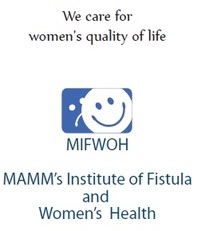 Donate HERE to MIFWOH
Donate HERE to MIFWOH
What is Obstetric Fistula?
Obstetric Fistula (OF) is a condition where woman develops one or more hole(s) between birth canal (vagina) and one or more of a woman's internal organ(s). This develops due to lack of skilled obstetric care when the woman has prolonged or obstructed labour. OF results in continuous leaking of urine or faeces through the genital tract. It is not just a hole but much more than that. It affects the physical, mental, and social well-being of the woman. The constant bad odour around her leads to isolation from family and community. In most of the cases the ultimate result is neglect or abandonment by husband, family members, as well as the society.
Obstetric Fistula (OF) is a condition where woman develops one or more hole(s) between birth canal (vagina) and one or more of a woman's internal organ(s). This develops due to lack of skilled obstetric care when the woman has prolonged or obstructed labour. OF results in continuous leaking of urine or faeces through the genital tract. It is not just a hole but much more than that. It affects the physical, mental, and social well-being of the woman. The constant bad odour around her leads to isolation from family and community. In most of the cases the ultimate result is neglect or abandonment by husband, family members, as well as the society.
What are the other maternal morbidities?
Other long term maternal morbidities or birth traumas from which women are suffering are:
Current situation of Obstetric Fistula and other maternal morbidities in Bangladesh
A national estimate of maternal morbidity conducted by BIRPERHT, in 1996, showed that 3.3% of women in Bangladesh suffer from urinary incontinence and among them over 400,000 women are living with fistula. 'Situation Analysis of Obstetric Fistula in Bangladesh' done by EngenderHealth and UNFPA in 2003 showed that an estimated total number of about 71,000 women are living with OF. The report also highlighted that many fistula sufferers are forced out of their homes, ostracised by family and friends. They consider themselves 'unclean' and due to lack of skills to earn a living, some have no choice but to beg to survive. Almost all of them are illiterate, poor and unaware that treatment is available; or cannot access or afford it. BIRPERHT also showed that about 15% women develop genital prolapse after childbirth and 9% suffer from impediments in their conjugal life due to the condition.
Other long term maternal morbidities or birth traumas from which women are suffering are:
- Uterine Prolapse (drop down of pelvic organs)
- Perineal tear
- Dysperunia (painful intercourse)
- Secondary Infertility (inability to conceive after any previous pregnancy or child birth)
- Pelvic Inflammatory Diseases (PID) and haemorrhoids
Current situation of Obstetric Fistula and other maternal morbidities in Bangladesh
A national estimate of maternal morbidity conducted by BIRPERHT, in 1996, showed that 3.3% of women in Bangladesh suffer from urinary incontinence and among them over 400,000 women are living with fistula. 'Situation Analysis of Obstetric Fistula in Bangladesh' done by EngenderHealth and UNFPA in 2003 showed that an estimated total number of about 71,000 women are living with OF. The report also highlighted that many fistula sufferers are forced out of their homes, ostracised by family and friends. They consider themselves 'unclean' and due to lack of skills to earn a living, some have no choice but to beg to survive. Almost all of them are illiterate, poor and unaware that treatment is available; or cannot access or afford it. BIRPERHT also showed that about 15% women develop genital prolapse after childbirth and 9% suffer from impediments in their conjugal life due to the condition.
© 2015 MIFWOH All Rights Reserved
